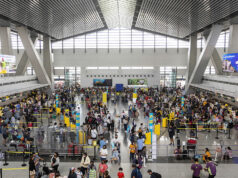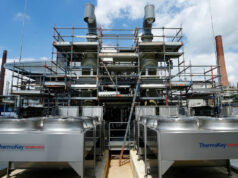TRAIN needed to fund infrastructure, free tuition, salary hikes — Dominguez
MOVES TO suspend the Tax Reform for Acceleration and Inclusion (TRAIN) law amid claims it worsens inflation will compromise other key economic programs introduced this year, the government’s economic managers said.
“Suspension of the Tax Reform program will certainly tend to slow down the Build Build Build program, and possibly negatively affect the government’s ability to fund the free tuition fee program as well as increase in salaries of the police and the military,” Finance Secretary Carlos G. Dominguez III told reporters in a mobile phone message yesterday.
Senator Paolo Benigno A. Aquino IV on Thursday filed Senate Bill 1798 seeking the suspension of the excise tax increases under the TRAIN law, or Republic Act No. 10963, when inflation exceeds the government’s target band for three months, noting that about 10 million Filipino families will “struggle” to purchase basic needs.
Headline inflation rose 4.1% in the first four months after coming in at 4.5% in April, breaching the central bank’s 2-4% target.
TRAIN is expected to generate about P82.3 billion this year.
According to the Development Budget Coordination Committee’s 2018 fiscal program, the government hopes to spend about P699.3 billion this year on infrastructure — which will be 70% funded by TRAIN revenue.
About P50 billion is needed for free tuition at state universities and colleges for the next school year, as provided by Republic Act No. 10931, or the Universal Access to Quality Tertiary Education Act, a measure originally authored by Mr. Aquino.
About P39.6 billion will go to the military and police pay increase, which became effective in January.
Socioeconomic Planning Secretary Ernesto M. Pernia, meanwhile, said separately during a press briefing yesterday that the legislators are “showing their concern especially for the poor. So that’s a normal expectation,” while noting that the 2019 mid-term polls are coming up.
Aside from Mr. Aquino, Senators Joseph Victor G. Ejercito and Sherwin T. Gatchalian are also seeking to freeze the tax increases provided by the TRAIN law.
The law took effect on Jan. 1, reducing personal income, estate and donors tax rates, but removed some value-added tax exemptions; raised excise tax rates for automobiles, minerals, tobacco and fuel; as well as imposed new excise levies on sugar-sweetened beverages and cosmetic procedures.
Budget Secretary Benjamin E. Diokno has said that suspending TRAIN will “do more harm than good,” especially for the government’s fiscal position. He noted that the country’s tax bureaus have been beating their collection targets.
Mr. Pernia said that the government is fast-tracking the disbursements of the P200 per month unconditional cash transfers for the poor affected by higher prices. — Elijah Joseph C. Tubayan



